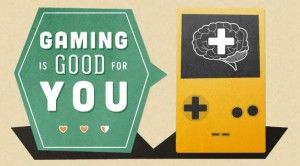
For as much joy as they’ve brought into my life, video games seem to have an inescapable place on the rhetorical hit-list of pundits, parents and pollsters alike. The examples are endless, but here are some modern highlights to set the stage: In 2010, Fox News presumptuously lambasted Mass Effect 2 for featuring “full digital nudity and sex,” two things the BioWare classic most certainly did not contain. Just last week, Rhode Island governor Lincoln Chafee ignited Twitter during an interview when he alluded to “all this violence, all this horrible sexism” inherent to video games. Philip Zimbardo, a professor emeritus in my very own Stanford Psychology Department, attempted to take a more scientific approach to game criticism in a book he released last week. He argues that young males are being re-wired by porn and video games –they’re the same, apparently – to “demand constant stimulation” and are “desensitized to reality and real-life interactions with others.” (For whatever reason, he completely fails to address the 42 percent of all gamers who are women and the 50 percent of gamers over age 37.)
Well-articulated or not, attacks on video games are nothing new. Even when our parents were playing Pong in their basements and Pac-Man at Pizza Hut, they shirked off a sizable population of player-haters.
The big surprise? After all these decades of mashing buttons, the world is still spinning. Apples still fall down off the tree, not up. Winter follows autumn. Young people are still getting up to no good, falling in love, tending to families and settling down the same way they always have. Life marches on in the video game era, and I daresay it’s a touch better because of them.
I won’t pretend that I can scientifically dismantle every argument against video games – not alone, at least, and not in a newspaper column. But as a lifelong gamer and a halfway-decent adult, I’m always eager to throw my hat in the ring.
Let’s start with some facts. Video games certainly do “re-wire” our brains, but not always in a bad way. According to independent research from the University of Rochester, for example, subjects who played action-oriented games made decisions 25 percent faster than others without sacrificing accuracy – and more adept gamers can make basic decisions up to four times faster than others, again with no decline in accuracy. Practiced gamers can also keep track of up to six things at once, compared to four for non-gamers. Another study found that game-playing women were better able to mentally manipulate 3D objects, a skill at which men are generally more adept. A longitudinal study by Linda Jackson on hundreds of Michigan middle schoolers found that more time playing games correlated to higher scores on a standardized assessment of creativity, completely regardless of the games’ genres.
If you put on a headlamp and get your hands dirty on Google, you can dig up plenty of fodder for the pro-game fire. Video games can improve literacy in four- and five-year-olds, help employees train at over 20 percent of Fortune 500 companies, ease pain during medical operations, cure lazy eyes and reduce surgical errors by nearly 40 percent. Two-thirds of gamers use them to bond with friends, and nowadays, fitness games can even teach us yoga and give us a legitimate workout.
All that info is out there, waiting to be found. I just wish more people would bother to look for it before they make ignorant claims about the world’s largest entertainment industry.
But my personal love affair with video games isn’t grounded in statistics. At its core, it rests on a lifetime of positive, formative and moving experiences.
The Zelda series has inspired my imagination, ever more intensely, since I was five. Pokémon Red and Blue, simple as they were, helped me learn to read. Final Fantasy VII drew out my first tears in response to a story of love and death – you may know the scene I’m referring to. Halo LAN parties, and the pizza that accompanied them, brought me together with friends of my youth. Even Grand Theft Auto III, that most egregious of transgressors, gave me a safe and healthy outlet for the kind of boyish, real-life trouble-making that any young man needs to get out of his system. (I’m sure that, like me, some of you reading this played GTA or Halo in your friends’ basements without their parents having a clue. Naughty indeed, but harmless.)
Since video games have undeniably made a large impact on the world, I wish people on both sides of the argument would open their eyes to the more subtle nuances of this intricate medium of expression and give it the respect, if not admiration, that it deserves.